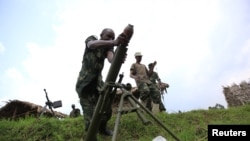The United Nations Security Council is set to discuss the U.N.'s mission in the Democratic Republic of Congo, as officials from that country call for a change in the mission's mandate to go after armed groups in its restive northeast.
The Security Council meeting Monday comes days after it extended the MONUSCO mission to protect civilians for another year.
The DRC's information minister, Lambert Mende, told VOA that the government wants the Security Council to act quickly.
"We are requesting that this mandate be changed as quickly as possible, so that we stop the killing of people and we stop the looting of our country," Mende said. "That is very, very important for us."
Mende also rejected neighboring Rwanda's denial of a U.N. report linking Kigali to a rebellion in the eastern DRC. The U.N. Group of Experts submitted the report to the Security Council in June. It cited evidence that Rwanda has been providing weapons and recruiting fighters for M23, a group of former soldiers who defected from the Congolese army earlier this year.
Mende said Rwanda needs to stop feeding what he called "criminal elements," which he said were operating to kill Congolese people and loot resources from the DRC's North Kivu province.
"What we need is for them to withdraw from our country, and they are going to face all this pressure from the international community because everybody is aware, despite the fact that they are denying," Mende said.
Rwandan Foreign Affairs Minister Louise Mushikiwabo told a forum in Nairobi Saturday that the case against her country is superficial, and that it has provided documents to "a number of false allegations."
Mende also rejected demands by M23 for President Joseph Kabila to resign before any peace negotiations can proceed. He repeated that Rwanda is behind the unrest and said the DRC is not facing a rebellion.
"Nobody proposed to those killers any negotiations, nobody," Mende said.
Rwanda and the DRC agreed earlier this month to the deployment of an international force to fight rebels in eastern Congo and to patrol their border.
M23 is composed of former soldiers believed to be loyal to Bosco Ntaganda, a warlord wanted by the International Criminal Court for alleged war crimes.
The Security Council meeting Monday comes days after it extended the MONUSCO mission to protect civilians for another year.
The DRC's information minister, Lambert Mende, told VOA that the government wants the Security Council to act quickly.
"We are requesting that this mandate be changed as quickly as possible, so that we stop the killing of people and we stop the looting of our country," Mende said. "That is very, very important for us."
Mende also rejected neighboring Rwanda's denial of a U.N. report linking Kigali to a rebellion in the eastern DRC. The U.N. Group of Experts submitted the report to the Security Council in June. It cited evidence that Rwanda has been providing weapons and recruiting fighters for M23, a group of former soldiers who defected from the Congolese army earlier this year.
Mende said Rwanda needs to stop feeding what he called "criminal elements," which he said were operating to kill Congolese people and loot resources from the DRC's North Kivu province.
"What we need is for them to withdraw from our country, and they are going to face all this pressure from the international community because everybody is aware, despite the fact that they are denying," Mende said.
Rwandan Foreign Affairs Minister Louise Mushikiwabo told a forum in Nairobi Saturday that the case against her country is superficial, and that it has provided documents to "a number of false allegations."
Mende also rejected demands by M23 for President Joseph Kabila to resign before any peace negotiations can proceed. He repeated that Rwanda is behind the unrest and said the DRC is not facing a rebellion.
"Nobody proposed to those killers any negotiations, nobody," Mende said.
Rwanda and the DRC agreed earlier this month to the deployment of an international force to fight rebels in eastern Congo and to patrol their border.
M23 is composed of former soldiers believed to be loyal to Bosco Ntaganda, a warlord wanted by the International Criminal Court for alleged war crimes.





